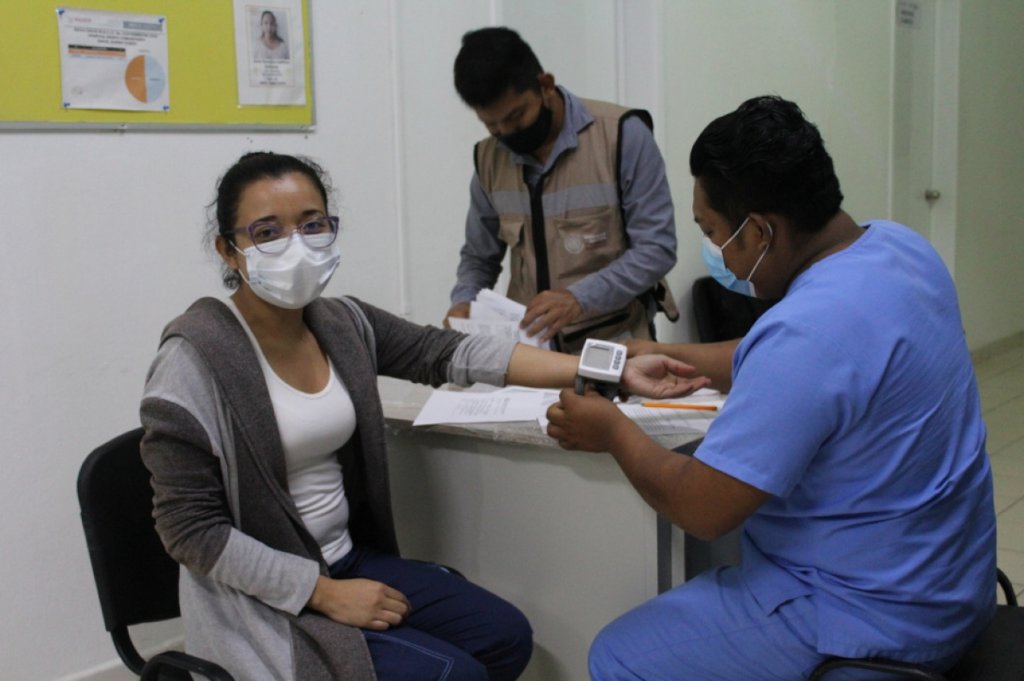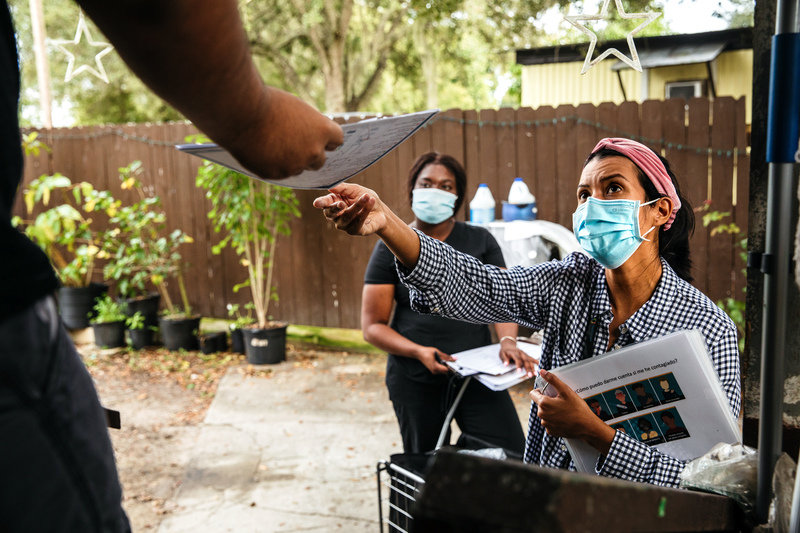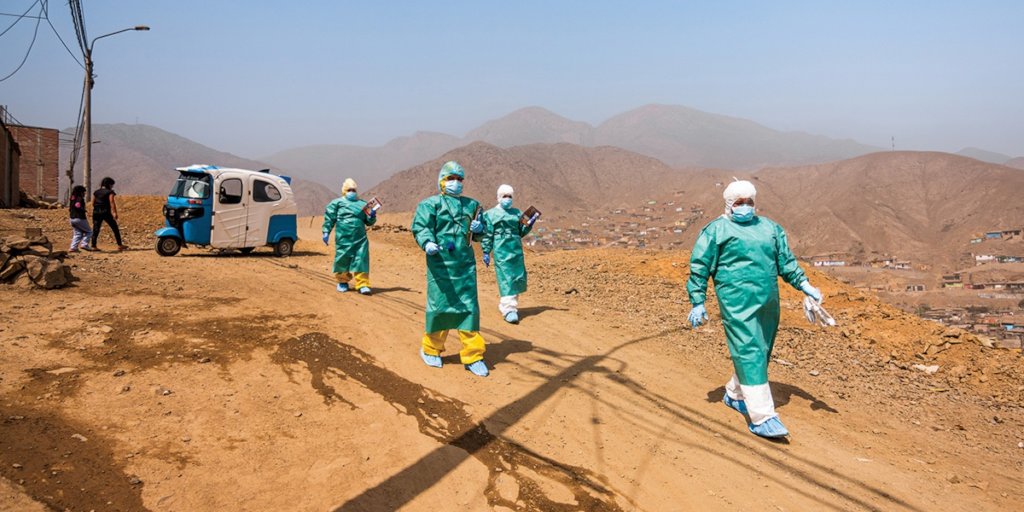By Hannah Garside | Annual Giving Coordinator
Due to the support of donors around the world, Partners In Health staff have begun to receive COVID-19 vaccines. Starting in late January, staff members in Chiapas, Mexico, began receiving their first dose of the vaccine, the first step of many in the long journey back to a post-COVID world.
When COVID-19 arrived in Mexico in late February last year, clinicians in Chiapas held their breath. The pandemic would not arrive in the southwestern state until March and, even then, would remain in the single digits for weeks. But doctors knew the worst was coming—it was only a matter of time.
“It took so long for the pandemic to reach Jaltenango,” says Dr. Selene Chacón of Compañeros En Salud, as Partners In Health is known locally. Chacón is based at the community hospital in Jaltenango de la Paz.
When the virus did arrive, it would leave no community unaffected. In late March, cases jumped from single to double digits, passing the 1,000 mark in May. By June, the surge had begun; Chiapas joined the rest of the country at the maximum “red light” level on the Mexican Ministry of Health’s stoplight map.
Compañeros En Salud has worked since 2011 in Chiapas, where it has focused on strengthening health systems in Jaltenango and surrounding rural communities. That work has included a mentorship program for first-year
state until March and, even then, would remain in the single digits for weeks. But doctors knew the worst was coming—it was only a matter of time.
“It took so long for the pandemic to reach Jaltenango,” says Dr. Selene Chacón of Compañeros En Salud, as Partners In Health is known locally. Chacón is based at the community hospital in Jaltenango de la Paz.
When the virus did arrive, it would leave no community unaffected. In late March, cases jumped from single to double digits, passing the 1,000 mark in May. By June, the surge had begun; Chiapas joined the rest of the country at the maximum “red light” level on the Mexican Ministry of Health’s stoplight
clinicians, a community health worker program, and support for the public health system, including a community hospital, a birthing center, and rural primary care clinics.
From the moment it arrived, COVID-19 put that system to the test—challenging doctors, nurses and care delivery teams to think quickly on their feet and improvise when necessary, in response to a pandemic that often showed little sign of relenting.
As cases ticked upwards, clinicians delivered critical treatment at all hours of day and night, tending to patients as they recovered, or as they took their last breath.
That care has made an impact. Although cases are ticking upwards, as expected following the holidays, clinicians are better prepared. The mortality rate in Chiapas has steadily declined since August. And the state was no longer “red” on the stoplight map, as of mid-January.
Now, as the fight against COVID-19 continues, clinicians are leveraging their expertise and experience to respond with compassionate care, applying lessons learned over the past several months. That work has made one thing clear: investing in public health systems is crucial—for the pandemic response and beyond.
A Race To Respond
When Selene Chacón finished medical school, she took a leap of faith and decided to do her year of social service, required by the Mexican government for all university graduates, with Compañeros En Salud through its pasante program.
The program, designed for first-year doctors and nurses, placed Chacón in a rural community clinic, where she provided primary care and received training and mentorship from experienced physicians. Chacón was so moved that, after the program ended, the newly minted doctor decided to continue her work with Compañeros En Salud.
Then, COVID-19 struck.
What followed was a race to respond to a public health emergency that intensified by the day. As COVID-19 cases mounted in Chiapas, clinicians scrambled for resources that were scarce, including tests, and struggled to keep up with rapidly evolving public health guidance.
“There was not much information at the time or guidelines on how to treat patients,” says Dr. Ana Rodríguez, who supervises the COVID-19 medical team at PIH-supported Angel Albino Corzo Community Hospital. “The protocols were based on very new information.”
But that didn’t stop clinicians. In her new role as infection and control coordinator, Chacón sprang into action, working with her team to establish a triage system at the hospital and to coordinate the pandemic response across all of Compañeros En Salud’s care delivery sites. And Rodríguez, based in the community hospital’s COVID-19 unit, treated patients, trained doctors, and managed care delivery.
None of those things were small feats.
Mexico provides universal health care to citizens, but that care can be hard to access in states like Chiapas, where the majority of people live in poverty, and in rural areas, where travel can be cumbersome and costly, often on poorly paved roads. For many rural communities, the nearest hospital is hours away.
‘We Are In This Together’
Despite the initial hurdles, Compañeros En Salud has delivered care to an increasing number of patients over the past several months as resources, staffing and capacity have improved. Since April, the team has treated at least 526 suspected and 16 confirmed cases at the community hospital and clinics.
In July, Compañeros En Salud partnered with Angel Albino Corzo Community Hospital to open the Respiratory Disease Center, a 5-bed facility equipped with oxygen concentrators to treat patients with severe COVID-19—care that once would have required a long, costly journey to another hospital at least two hours away. Within weeks, the center saw its first patients and helped them recover and return home to their families.
Compañeros En Salud also worked with hospital leadership to introduce a new policy that allows family members to visit their loved ones with personal protective equipment—the only hospital in the area that offers such visitation. That decision has been crucial in helping patients recover and fighting the disinformation about the virus that once ran rampant, encouraging more people to seek medical care.
“Patients now have more information and less stigma,” says Rodríguez.
She has seen that shift first-hand. Nowadays, patients come to the hospital early on, when their symptoms are still mild, instead of waiting until they worsen—a sign that gives clinicians hope that communities now have a better understanding of the virus and when to seek care.
“At Compañeros En Salud, we are already more prepared,” says Chacón. “We already have experience, and this is a strength.”
Still, the doctor urges caution. “We cannot lower our guard,” she says. “There will still be peaks…people must know that we are still here and we are in this together.”
Links:
By Annie Niland | Community Giving Coordinator
By Annie Niland | Community Giving Coordinator
Project reports on GlobalGiving are posted directly to globalgiving.org by Project Leaders as they are completed, generally every 3-4 months. To protect the integrity of these documents, GlobalGiving does not alter them; therefore you may find some language or formatting issues.
If you donate to this project or have donated to this project, you can recieve an email when this project posts a report. You can also subscribe for reports without donating.
Support this important cause by creating a personalized fundraising page.
Start a Fundraiser


